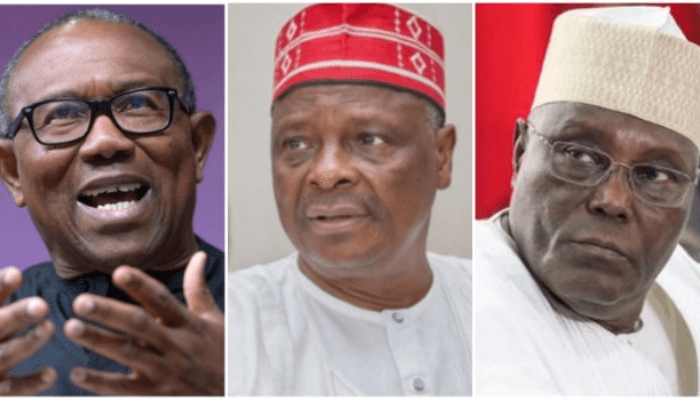Atiku Abubakar, Peter Obi and Rabiu Kwankwaso, three major candidates in the 2023 presidential elections, have voiced concerns over blackouts in various states across the eastern and northern parts of Nigeria, calling for the use of renewable and non-renewable energy sources across the nation.
Businesses and households in the affected parts of the country have been in darkness for weeks and are yet to recover from the subsequent national grid collapses experienced on October 14, 15, and 19, 2024.
Atiku, the presidential candidate of the People’s Democratic Party (PDP), Obi of the Labour Party (LP), and Kwankwaso of the New Nigeria People’s Party (NNPP) aired their grievances on their X accounts.
“The electricity power crisis in Nigeria continues to be a matter of immense concern. In particular, the reference is the situations in both the Southeast and the entire states of the Northwest and Northeast that have been in complete blackouts in the past three weeks,” said Atiku.
The former vice president urged every government department responsible for addressing the problem to take swift intervention and restore electricity back to the distressed geopolitical zones.
He also called for the adoption of a mix of renewable (hydro, solar, wind, and biofuels) and non-renewable (coal, gas) sources of energy, “considering that energy opportunities exist in different parts of the country, our strategy should be viable.”
On Saturday, the Transmission Company of Nigeria (TCN) revealed that the current outage affecting Northern states for several days is a result of vandalism of the Shiroro-Mando transmission line, a critical infrastructure that supplies electricity to the region.
TCN stated, “Prevailing insecurity in the area has delayed the immediate repair necessary to restore supply. However, as a temporary measure, TCN had rerouted the bulk power supply through the Ugwuaji-Apir 330kV line, which recently snapped.
“TCN has been collaborating closely with the Office of the National Security Adviser (NSA) to work with our engineers to access the vandalism site to enable them to effect necessary repairs. This is vital to ensure the safety of lives during the repairs.”
“We remain steadfast in our commitment to overcoming these challenges because we understand the place of electricity in the socio-economic lives of the people and the extreme inconveniences this situation is causing the government and all electricity customers in all the affected areas.”
The 330kV Shiroro-Kaduna power line supplies the states of Kano and Kaduna and another line that supplies Bauchi, Gombe, and other parts of the northeast.
However, as of the time of filing this report, multiple reports still claim that the regions are yet to be electrified.
“The negative impact of the continued power outage on businesses, especially small businesses, who depend primarily on public power supply to sustain their businesses as a means of livelihood, is unimaginable,” said Peter Obi.
According to Obi, this power crisis, when combined with the present high cost of petroleum products and a harsh operating environment, remains a lethal recipe for widespread business failure and increasing poverty in the country.
“I have consistently maintained that solving Nigeria’s power and energy crisis is not rocket science. Many of our comparable peer nations have demonstrated how possible it is to provide sustainable power for their citizens.
“Our African neighbour, Egypt, for example, invested aggressively in their power sector, which resulted in the establishment of sustainable power infrastructure by way of many power stations.
“Today, Egypt has revolutionized power and energy production in the country, providing sustainable power to millions of small businesses, which account for over 90 percent of active enterprises in the country and contribute to over 80 percent of their GDP,” he added.
In addition, Obi called on the government to ramp up efforts and provide both immediate and long-term solutions to this seemingly perennial challenge.
For Rabiu Kwankwaso, the time it has taken to address the issue of vandalism and theft in the sector highlights the huge deficit of capacity the nation’s power sector faces in addressing large-scale problems, noting that the situation must be addressed to avoid any future disruption.
He urged the stakeholders in the sector to look into alternative power sources to address the nation’s energy needs.
“I wish to encourage all state governments and private investors to invest in alternative electricity sources, just like we did in Kano by installing two turbines in the Challawa Gorge and Tiga Dams in order to reduce the reliance on our inadequate and aged energy sources,” he said.
